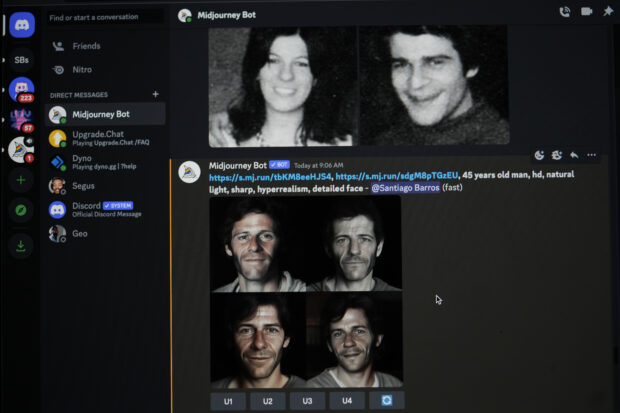Santiago Barros, an Argentine publicist, is using artificial intelligence to create images of what the children of parents who disappeared during Argentina’s military dictatorship might look like today. Barros combines photos of the disappeared fathers and mothers from the public archive of the activist group Grandmothers of Plaza de Mayo, using an app called Midjourney. The app generates images of what the faces of these children might look like as adults. Barros then shares these images on an Instagram account called iabuelas, which stands for “artificial intelligence” and “grandmother” in Spanish. The aim of this project is to raise awareness among those who may have doubts about their origins and to honor the work of the Grandmothers group in searching for these missing children.
During the dictatorship from 1976 to 1983, babies were systematically taken from political dissidents who were detained or executed. These babies were often raised by families linked to the dictatorship as their own. The Grandmothers of the Plaza de Mayo estimate that around 500 children were snatched from their parents during this time, and they have managed to locate 133 grandchildren through genetic analysis.
Barros’s project is not meant to replace the efforts of the Grandmothers group in identifying the grandchildren through DNA testing. Instead, it serves as a reminder of the decades of work the group has dedicated to finding these children. The project has received praise from the group, although they caution that DNA testing is the only reliable method to establish the true identity of these individuals.
While Barros acknowledges that the app he uses may not be completely accurate, he emphasizes that many of the disappeared individuals had European ancestors, as Argentina has a history of strong European immigration. The Grandmothers group also urges caution when interpreting the results of the AI-generated images, as they may not be completely accurate due to the limitations of foreign applications and the complexity of human genetics.
Since the launch of Barros’s initiative, there have been no known cases of individuals recognizing themselves in the generated images and initiating a formal identification process. However, the project has provided comfort and hope to families searching for their lost relatives, as they have discovered striking resemblances in the generated images.
It is important to note that the iabuelas Instagram account specifies that it is an unofficial artistic project and that the results generated by artificial intelligence can be inaccurate. This disclaimer aims to prevent false expectations among those who may find similarities with the images.
In conclusion, Santiago Barros’s project uses artificial intelligence to create images of what the children of parents who disappeared during Argentina’s dictatorship might look like today. While the project has received praise for raising awareness about the issue, it is important to approach the AI-generated images with caution, as they may not be completely accurate.
Denial of responsibility! VigourTimes is an automatic aggregator of Global media. In each content, the hyperlink to the primary source is specified. All trademarks belong to their rightful owners, and all materials to their authors. For any complaint, please reach us at – [email protected]. We will take necessary action within 24 hours.


